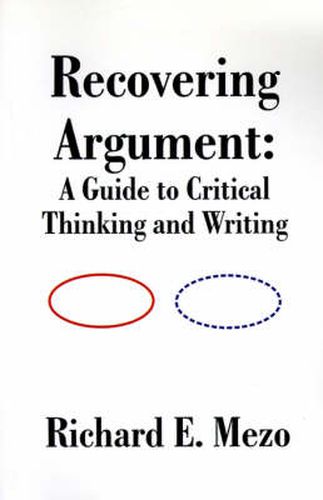Readings Newsletter
Become a Readings Member to make your shopping experience even easier.
Sign in or sign up for free!
You’re not far away from qualifying for FREE standard shipping within Australia
You’ve qualified for FREE standard shipping within Australia
The cart is loading…






This title is printed to order. This book may have been self-published. If so, we cannot guarantee the quality of the content. In the main most books will have gone through the editing process however some may not. We therefore suggest that you be aware of this before ordering this book. If in doubt check either the author or publisher’s details as we are unable to accept any returns unless they are faulty. Please contact us if you have any questions.
Recovering Argument is a textbook or handbook that sounds a revolutionary call to teachers and students of rhetoric, asking, as it implicitly does, for a return to reason as the basis of all argument. The implied purpose of the book is to recover argument from its current status among teachers, who often view composition as a merely personal exercise, with an emphasis upon invention (now the most important part of so-called process writing). It attempts to provide a framework for understanding discourse and its position and function in a democratic society.
In addition to calling for a return to reason, Recovering Argument suggests new models and approaches to the teaching of writing. A model of communication (a humanistic model) is offered as a replacement for the widely-accepted analogy that would turn writer and audience into radio transmitters and receivers. A new treatment of audience clearly and succinctly demonstrates that the writer does not need to be a slave to demographics, but rather that the writer of any argument must search for truth, however unpalatable that truth may be to the audience. A much-needed review of the differences between spoken and written language is provided herein, and the reader is shown the placement of argument within the Western rhetorical tradition and the importance of the continuing dialogue that began with Plato and Aristotle.
This brief text could be used in a college or upper-level high school course in rhetoric or writing as a supplementary text or as the core text in addition to supplementary readings. The freshness of the material is sure to stimulate thought and discussion. The examples of argument in the appendix provide a foundation for individual response and for further study.
$9.00 standard shipping within Australia
FREE standard shipping within Australia for orders over $100.00
Express & International shipping calculated at checkout
This title is printed to order. This book may have been self-published. If so, we cannot guarantee the quality of the content. In the main most books will have gone through the editing process however some may not. We therefore suggest that you be aware of this before ordering this book. If in doubt check either the author or publisher’s details as we are unable to accept any returns unless they are faulty. Please contact us if you have any questions.
Recovering Argument is a textbook or handbook that sounds a revolutionary call to teachers and students of rhetoric, asking, as it implicitly does, for a return to reason as the basis of all argument. The implied purpose of the book is to recover argument from its current status among teachers, who often view composition as a merely personal exercise, with an emphasis upon invention (now the most important part of so-called process writing). It attempts to provide a framework for understanding discourse and its position and function in a democratic society.
In addition to calling for a return to reason, Recovering Argument suggests new models and approaches to the teaching of writing. A model of communication (a humanistic model) is offered as a replacement for the widely-accepted analogy that would turn writer and audience into radio transmitters and receivers. A new treatment of audience clearly and succinctly demonstrates that the writer does not need to be a slave to demographics, but rather that the writer of any argument must search for truth, however unpalatable that truth may be to the audience. A much-needed review of the differences between spoken and written language is provided herein, and the reader is shown the placement of argument within the Western rhetorical tradition and the importance of the continuing dialogue that began with Plato and Aristotle.
This brief text could be used in a college or upper-level high school course in rhetoric or writing as a supplementary text or as the core text in addition to supplementary readings. The freshness of the material is sure to stimulate thought and discussion. The examples of argument in the appendix provide a foundation for individual response and for further study.